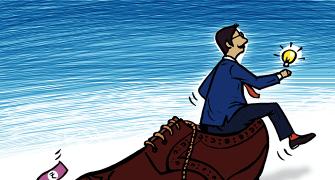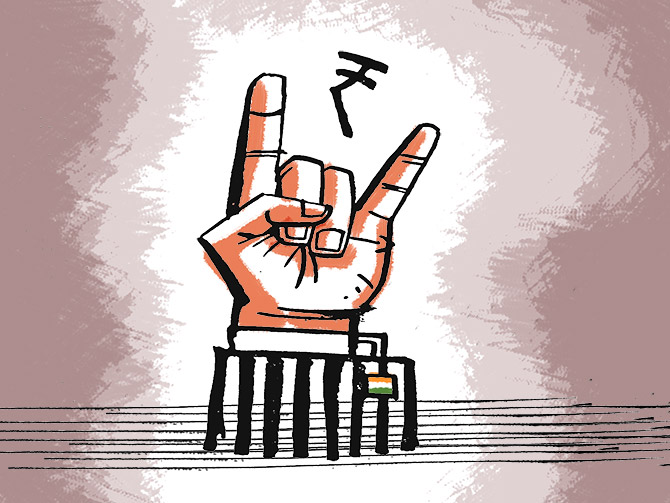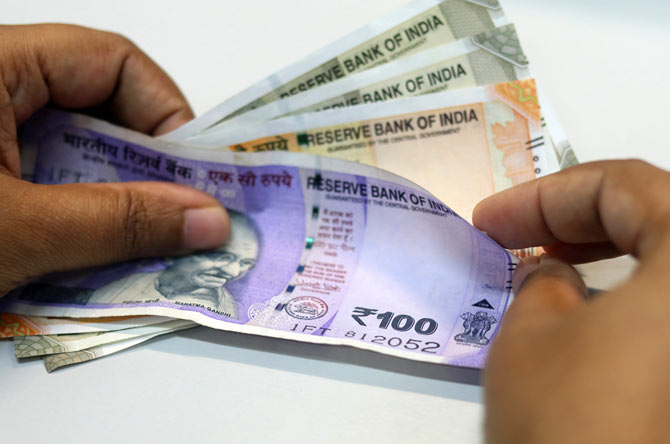'People can start making a safety net, and that safety net should be at least three months of your monthly salary.'
'If somebody is earning Rs 25,000 then s/he should have at least Rs 75,000 in her/his bank account, so that if anything like this (lockdowns) happens in the future, they are not struggling.'

Gaurav Chopra's IndiaLends, an online fintech platform that connects borrowers and lenders, conducted an online survey recently to find out the impact of the COVID-19 lockdown on the financial health of salaried individuals and self-employed professionals.
While 94 per cent of the 5,000 respondents polled said they will be extra careful with their expenses, 84 per cent revealed their intent to cut down on expenses, 72 per cent said they will go for a personal loan to make ends meet.
The figure Chopra found surprising though was that out of the 5,000 people polled, 70 per cent people had an existing loan during the lockdown period, out of which a whopping 45 per cent said they opted for a loan moratorium.
Chopra reveals that these 45 per cent (of the 70 per cent of the total respondents), or about 1,575 individuals, could have opted for a loan moratorium, not because they may not have had the money to pay the equated monthly installments, but because they were creating a future safety net for themselves and their families, underlining the uncertainty and insecurity with which these two sections of income earners suffer from.
"Most young professionals spend a lot of money by going out to restaurants, entertainment, buying or upgrading their mobile phones. But this lockdown has taught us that we don't need all those things that often," Chopra tells Rediff.com's Prasanna D Zore.
What does your survey tell you about the financial crisis faced by salaried and individual professionals?
It is actually a very worrisome survey if you think about it. Now, one part of it also could be that the guys (those who responded to the survey) who responded are the ones who are in distress and sharing their pain.
We did a good sample size of close to 5,000 and the questions were on the lines of:
'How is your financial health compared to pre-COVID-19?'
'Are you worried about it?'
'Will you be spending money when the lockdown opens?'
'Which are the areas you will be spending money on?'
'Are you going to be travelling?'
'Are you going to be spending on luxury goods?'
'Are you going to be looking at medical, essential goods, education?'
All such questions and the results that came out were that essentially about 80 per cent of people said that they are actually struggling right now.
We know for a fact that across salaried and self employed professionals there has been some deterioration in the income of people.
In the case of self employed it is very obvious, because if you are not a essential-services business owner, like you have a shop in a mall, or you are a driver, or you are managing a small fleet cars or run a security guards agency, for example, which are employed in a corporate setting have seen loss in income.
On the salaried front, it is a combination of three things.
One is the overall fear about the economy and job loss.
Today I have a job, but I'm not sure if it will be there three months later.
Every time you put on any news channel they only talk about this company's turnover has come down, this company's factories have shut down, which automatically means that people who are working in those industries or similar industry know for a fact that if the company is not making revenues or not making profit, it will only be a matter of time before job cuts or salary cuts start coming in.
How many of those you surveyed spoke about this insecurity or the fear they will lose their jobs in the next three months if things don't improve?
That was not a question because we wanted to also make sure that people give genuine responses.
The question was 'Are you concerned about future savings and financial future?' as opposed to 'Is your job safe and secure?'
But people are worried about the overall economy.
The other two parts is that people have already seen a job cut or pay cut happening.
Within pay cuts you can see things such as your bonuses being deferred, or increase in salary is not happening.
About layoffs, we have the news channels talk mostly about the big companies, but if you speak to any entrepreneur, business owner (in the MSME sector), he will tell you that, yes, I have done pay cuts and job cuts as well and that is where people are feeling the pain happening.
Similarly, pay reductions have happened, but many people also feel that while in the lockdown, their expenses have also come down. That is in a way the saving grace.
They are saying that while their incomes and savings are going down, their expenses are also low.
But people get worried thinking that what if my salary doesn't increase after things come back to normal and that is a worrying issue.
Did you have people who were not getting their salaries in time? Like the salaries are deferred by 15 days, 30 days?
I will tell you what all our questions were. We wanted to make sure that we get a good response.
For example, the questions were like:
'Is the uncertainty in the economy preventing you from making purchases or investments that you would otherwise make?'
'Are you cutting back on your spending?'
'Do you think you have to be more careful about your expenses in the future?'
'Are you concerned about your savings?'
'Do you have any existing loans?'
'Have you opted for a moratorium?'
'Or do you think your ability to make financial ends meet has been impacted and is uncertainty in the economy preventing you from doing certain things?
And then some generic questions like 'How will your expenses be categorised in a post-COVID situation'?
Whether people will increase or decrease or keep unchanged their purchases of essentials, apparels, travel, holiday entertainment, luxury goods, furniture, vehicles, home rentals, and then we went on to the personal loan side that 'Do you plan to go for a personal loan in the near future, and if so, what categories?'
This was a neutral survey, but tried to get the most real responses out of people.
How many people opted for loan moratoriums? And do they know how much more they will be paying, if they opted for it?
Overall, that number was in the 45 per cent range.
Out of the people that we surveyed, around 70-odd per cent had some kind of loan. And out of these, 45 per cent people had opted for the moratorium.
Did they have any idea about how they are going to service this moratorium part because the interest cost will be huge?
Were they aware of the financial consequences of the loan moratorium?
Right in the beginning, when the RBI announced the first moratorium, people like me and my immediate finance team, who understand finance very well, even we were a bit confused about what is allowed, what is not allowed, or how is interest going to be calculated, or is interest on interest going to be calculated, how do you have to repay, is it a bullet payment, is it extension of the tenure or is it increase of the EMI amount, and all those things.
So we realised very soon that financially educated people like us are finding it difficult to understand then the common man will be in a nightmarish position. So very early on, we actually reached out to our customer base.
We wrote to our user base telling them if you have the money, please continue paying your EMI; do not opt for the moratorium; it is not the right thing to do.
We said, if you have any questions, concerns reach out to us. And then we did a series of things reaching out to customers requesting them to not opt for it because this is not interest-free period, or some kind of debt holiday.
If you are not paying your EMI, you are still going to get interest charged on your principal amount. And that is going to be hefty. So that was our messaging that went out.
This was done early on when the moratorium was announced. It was our duty to tell people that this is going to be more expensive, and so they must contact their lenders for exact terms and conditions because there are whole lot of permutation combinations, which are very lender specific.
At IndiaLends we don't lend ourselves; we don't have a NBFC or a balance sheet; we lend on behalf of 55 different banks, NBFCs and fintechs.
We have about seven million users. Our advice to them was: Be aware of what your rights and obligations are.
Secondly, you must know for a fact that this is going to be more expensive.
If you have the money to pay the EMI, even if it comes from your savings or fixed deposits, then go for it.
The interest that you are earning on your savings or FDs is going to be minute compared to what (interest amount) you will be paying on your personal loan or home loan or credit card for that matter.
After knowing this, if you still feel you want to take the moratorium then please get in touch with your lender and ask them the terms and conditions, what is the process and once you are satisfied only then go for it.
Could you share some statistics that you found stark given the situation that people are in?
India has traditionally been a savings economy.
From the previous generation, we have all grown up hearing that save first and then spend some from what is left; people who are now probably in their 50s and beyond still have that savings habit.
With that in mind, 90 per cent people expressed concern about their savings and future financials.
Similarly, 75 per cent people said they are not in a position to make fresh investments.
Now when that happens, you get worried because all these investments and savings are there for the rainy day.
We are already in the rainy days and nobody knows when it's going to end.
The state of finances going forward is a huge concern.
If things become fine, everybody get back their salaries and get into jobs, then there is nothing to worry about.
But if people are unemployed, or there is underemployment, then obviously, it is a worrying factor where people are dipping into their savings and are concerned about savings going forward.
Even after all our efforts, we found that 45 per cent people have applied for the moratorium, which is quite high.
I would have imagined that this number should be somewhere in the 15 to 20 per cent range.
Which means that these 45 per cent of people had not saved for the rainy day? That they wouldn't have three-month emergency savings buffer?
The reason behind that (so many people opting for loan moratorium) is more for future protection.
This is the mindset of a person who takes a loan and the whole EMI mindset is that I am going to enjoy today and I'm going to pay it off over a period of time.
That is where the whole debt economy is at.
Whether it be for a car, home, gadget, or holiday and that is where people are very comfortable taking loans.
So now the choice here is that either I continue to pay X amount of rupees as my EMI (without going for a loan moratorium) which I have in my bank today, or I actually save this X by going for a moratorium, because I know that things might get worse.
If things don't get worse, I will pay X plus something (the interest on the principal outstanding accrued during the moratorium period) which I'm comfortable paying.
At least right now I have that money in the account that can be used if some emergency comes up.
I don't have to go and beg, borrow from others or apply for more loans.
It's the same mindset where people take a loan thinking, 'okay, I will pay some interest on it. That is the same mindset which makes people go for an extended moratorium, not so much the fact that I don't have the money.
When the moratorium was announced, it was very early on in the lockdown when people hadn't lost their jobs or were facing salary cuts.
Some form of livelihood was still going on. So it is wrong to assume that those 45 per cent of people opted for a moratorium because they didn't have the money.
They did have the ability to pay, but it (loan moratorium) was more of a safety net they wanted to create.
That when things go bad, we have this money available. We are happy to pay a slightly higher interest rate when life comes back to normal.
Did you observe any signs of distress, despondency or insecurity among the polled individuals? Did you have people talking about an uncertain future, suicidal tendencies?
One question in the survey was 'Do you think you have to be more careful about how you spend your money?' And again, this comes down as a moral question also, so 94 per cent of the people said yes.
I think maybe that question should have been worded better. Because even if in normal times, you have asked people this question their response would have yes.
But, otherwise, are people cutting back on their spending? That is where around 85 per cent people said yes, we are cutting back on spending.
Are people also cutting back on their investments and insurance?
No, we did not mention the word insurance, but it was investment and spending.
What would be your advice to young professionals and salaried individuals on how to tide over the financial crisis once the lockdown is lifted?
Save as much as you can.
What this lockdown has taught us is that your expenses can actually be controlled.
Most young professionals -- and we have a lot of them in my organisation -- spend a lot of their money by going out to restaurants, entertainment, buying or upgrading their mobile phones every now and then, which is fine because they are getting the money, they feel empowered.
But this lockdown has also taught us in the last few months that we actually don't need all those things that often also.
So, people can start making a safety net, and that safety net should be at least three months of your monthly salary.
If somebody is earning Rs 25,000 then s/he should have at least Rs 75,000 in her/his bank account, so that if anything like this (lockdowns) happens in the future, they are not struggling.
Even with the economy being uncertain, if people were to lose their jobs or a pay cut were to happen, then they have at least three months of income to support themselves and their families.
And that could only happen if they cut down on some of these spends.
Like, choosing to go out every weekend, can that be made to one day a month or every alternate month?
Instead of changing their mobile phones every 12 months, can that be extended to 18 months?
It's all about savings from here and making sure that it's not hand-to-mouth existence when you have people spend all their money on entertainment and discretionary expenses.
The whole savings mindset has to come back.
Do you foresee a huge change in people's spending and savings behaviour going ahead because of the lockdown?
It is both a supply and demand thing over there.
When I say supply, I don't foresee travel to come back to where it was in January, February.
People like you and me are probably saying we will not travel this year at all. Zoom is good for our business meetings and we don't want to risk going out for holidays.
One important message I got yesterday was that the lockdown is being lifted because of the economy and not because it is safe to do so.
All this safety insecurity and fears will make sure that people are not able to spend anything.
If a shopping mall is not open, you will not go there.
If a restaurant is not open, you will not go there.
If there are no flights, you will not travel.
So automatically that behaviour will come in.
Now, let's assume that everything becomes normal.
The unfortunate truth is that the power of hindsight is very limited, and sooner or later people will come out of it. And, life does become normal then.
So, maybe for a few months, people will remember that they were in this fear, that our jobs will not be there, and that you will have to control spending, but once things start reviving then people will come back to their normal habits.
If they form a habit of savings right now, great. If not, then, we will be back to the normal (spending first without thinking of savings).









